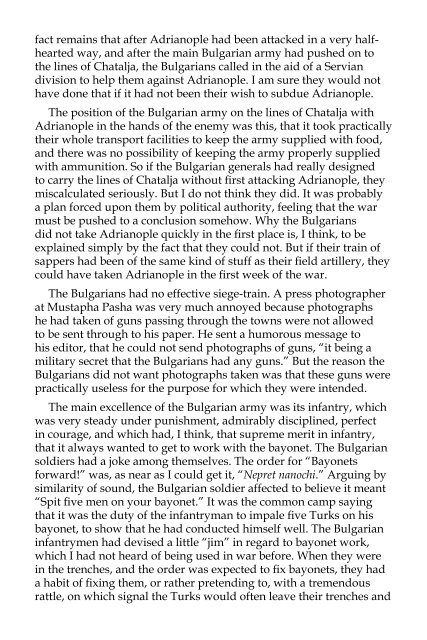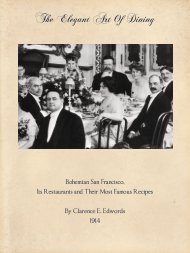Bulgaria e-book - iMedia
Bulgaria e-book - iMedia
Bulgaria e-book - iMedia
You also want an ePaper? Increase the reach of your titles
YUMPU automatically turns print PDFs into web optimized ePapers that Google loves.
fact remains that after Adrianople had been attacked in a very halfhearted<br />
way, and after the main <strong>Bulgaria</strong>n army had pushed on to<br />
the lines of Chatalja, the <strong>Bulgaria</strong>ns called in the aid of a Servian<br />
division to help them against Adrianople. I am sure they would not<br />
have done that if it had not been their wish to subdue Adrianople.<br />
The position of the <strong>Bulgaria</strong>n army on the lines of Chatalja with<br />
Adrianople in the hands of the enemy was this, that it took practically<br />
their whole transport facilities to keep the army supplied with food,<br />
and there was no possibility of keeping the army properly supplied<br />
with ammunition. So if the <strong>Bulgaria</strong>n generals had really designed<br />
to carry the lines of Chatalja without first attacking Adrianople, they<br />
miscalculated seriously. But I do not think they did. It was probably<br />
a plan forced upon them by political authority, feeling that the war<br />
must be pushed to a conclusion somehow. Why the <strong>Bulgaria</strong>ns<br />
did not take Adrianople quickly in the first place is, I think, to be<br />
explained simply by the fact that they could not. But if their train of<br />
sappers had been of the same kind of stuff as their field artillery, they<br />
could have taken Adrianople in the first week of the war.<br />
The <strong>Bulgaria</strong>ns had no effective siege-train. A press photographer<br />
at Mustapha Pasha was very much annoyed because photographs<br />
he had taken of guns passing through the towns were not allowed<br />
to be sent through to his paper. He sent a humorous message to<br />
his editor, that he could not send photographs of guns, “it being a<br />
military secret that the <strong>Bulgaria</strong>ns had any guns.” But the reason the<br />
<strong>Bulgaria</strong>ns did not want photographs taken was that these guns were<br />
practically useless for the purpose for which they were intended.<br />
The main excellence of the <strong>Bulgaria</strong>n army was its infantry, which<br />
was very steady under punishment, admirably disciplined, perfect<br />
in courage, and which had, I think, that supreme merit in infantry,<br />
that it always wanted to get to work with the bayonet. The <strong>Bulgaria</strong>n<br />
soldiers had a joke among themselves. The order for “Bayonets<br />
forward!” was, as near as I could get it, “Nepret nanochi.” Arguing by<br />
similarity of sound, the <strong>Bulgaria</strong>n soldier affected to believe it meant<br />
“Spit five men on your bayonet.” It was the common camp saying<br />
that it was the duty of the infantryman to impale five Turks on his<br />
bayonet, to show that he had conducted himself well. The <strong>Bulgaria</strong>n<br />
infantrymen had devised a little “jim” in regard to bayonet work,<br />
which I had not heard of being used in war before. When they were<br />
in the trenches, and the order was expected to fix bayonets, they had<br />
a habit of fixing them, or rather pretending to, with a tremendous<br />
rattle, on which signal the Turks would often leave their trenches and<br />
run, expecting the bayonet charge; but the <strong>Bulgaria</strong>ns still stuck to<br />
their trenches, and got in another volley.<br />
The artillery work of the <strong>Bulgaria</strong>ns was very good indeed; they<br />
had an excellent field-piece, practically the same field-piece as the<br />
French army. Their work was very fine with regard to aim and to the<br />
bursting of shrapnel, and their firing from concealed positions was<br />
also good. But I never saw enterprising work on their part; I never<br />
saw them go into the open, except during a brief time at Chatalja.<br />
They seemed to dig themselves in behind the crest of a hill, where<br />
they could fire, unobserved by the enemy.<br />
Now, with regard to the conduct of the troops. Much has been<br />
said about outrages in this war. I believe that in Macedonia, where<br />
irregular troops were at work, outrages were frequent on both sides;<br />
but in my observation of the main army there was a singular lack of<br />
any excess. The war, as I saw it, was carried out by the <strong>Bulgaria</strong>ns<br />
under the most humane possible conditions. At Chundra Bridge I<br />
was walking across country, and I had separated myself from my<br />
cart. I arrived at the bridge at eight o’clock at night, and found a<br />
vedette on guard. They took me for a Turk. I had on English civilian<br />
green puttees, and green was the colour of the Turks. It was a cold<br />
night, and I wished to take refuge at the camp fire, waiting for my<br />
cart to come. Though they thought I was a Turk, they allowed me<br />
to stay at their camp fire for two hours. Then an officer who could<br />
speak French appeared, and I was safe; the men attempted in no way<br />
to molest me during those two hours. They made signs as of cutting<br />
throats, and so on, but they were doing it humorously, and they<br />
showed no intention to cut mine. Yet I was there irregularly, and I<br />
could not explain to them how I came to be there.<br />
The extraordinary simplicity of the commissariat helped the<br />
<strong>Bulgaria</strong>n generals a great deal. The men had bread and cheese,<br />
sometimes even bread alone; and that was accounted a satisfactory<br />
ration. When meat and other things could be obtained, they were<br />
obtained; but there were long periods when the <strong>Bulgaria</strong>n soldier<br />
had nothing but bread and water. (The water, unfortunately, he took<br />
wherever he could get it, by the side of his route at any stream he<br />
could find. There was no attempt to ensure a pure water supply for<br />
the army.) I do not think that without the simplicity of commissariat<br />
it would have been possible for the <strong>Bulgaria</strong>n forces to have got as<br />
far as they did. There was an entire absence of tinned foods. If you<br />
travelled in the trail of the <strong>Bulgaria</strong>n army, you found it impossible<br />
to imagine that an army had passed that way; because there was





